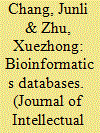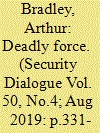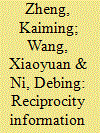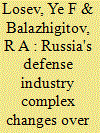|
|
|
Sort Order |
|
|
|
Items / Page
|
|
|
|
|
|
|
| Srl | Item |
| 1 |
ID:
101072


|
|
|
|
|
| Publication |
2010.
|
| Summary/Abstract |
Intellectual property (IP) protection for bioinformatics databases plays a key role in accelerating development of biological sciences and biotechnological industry. This paper presents current and global position of IP protection in bioinformatics database. A protection method has been proposed after analysing characteristics of bioinformatics databases and considering different database protection methods. Further, the paper seeks to analyse the diffusion process of biological information and develops an argument that bioinformatics primary database should be put in public domain, though they may be given financial subsidies by the government or other public funds according to the diffusion phase of biological information. Suitable methods of IP protection in the bioinformatics secondary database have been suggested.
|
|
|
|
|
|
|
|
|
|
|
|
|
|
|
|
| 2 |
ID:
110770


|
|
|
|
|
| Publication |
2011.
|
| Summary/Abstract |
This article assesses the extent to which security regimes are the products of authorization in the thought of Thomas Hobbes and Carl Schmitt. The Hobbesian security regime offers a contingent construction of security in terms of processes of authorization and brings into view questions about the epistemic construction of security within security discourse today. The Schmittian concept of security involves the naturalization of security through the state, meaning that security is understood as condition rather than regime. Rather than look to Carl Schmitt's concept of security as the paradigm of international security today, there are clear benefits in returning to the contractual account of security evident in the Hobbesian emphasis on authorization. Security is not the primary value of political community, but the means by which political communities realize their internal goods. Schmitt's security regime is fictive, driven by colourful metaphor and political theology. By returning to classic questions of authorization-how a security regime authorizes itself-International Relations theory can examine the legitimation of security beyond an exclusively state-centric model.
|
|
|
|
|
|
|
|
|
|
|
|
|
|
|
|
| 3 |
ID:
167409


|
|
|
|
|
| Summary/Abstract |
This article proposes a political prehistory of drone theory that traces its juridico-political evolution from the 17th century to the present day. To outline my argument, I construct a constellation between Hobbes’s theory of sovereign punishment in Leviathan and Chamayou’s critique of drone warfare in Drone Theory to illuminate the political origins of drone violence. First, I argue that Hobbes’s social contract theory lays the conceptual groundwork for Chamayou’s drone theory. Second, I contend that Hobbes’s theory of the sovereign punishment of domestic citizens preempts Chamayou’s critique of drone warfare against foreign enemies. Finally, I speculate that Hobbes’s theory of punishment is founded upon a sacrificial paradigm that returns in the phenomenon of domestic drone strikes. In summary, I argue that Hobbes might be something close to the first drone theorist insofar as his political theory systematically produces the state of exception between citizen and enemy in which the drone operates today. What, then, are the theoretical origins of drone warfare? How does the punishment of citizens prefigure drone warfare against foreign enemies? To what extent might even citizens themselves be a species of drone who may be activated by the sovereign at any point?
|
|
|
|
|
|
|
|
|
|
|
|
|
|
|
|
| 4 |
ID:
163341


|
|
|
|
|
| Summary/Abstract |
There is now high level international commitment to the goal of universal health coverage. But how can countries make this a reality in the face of a limited budget and an aging population? Since 2008, China has been rolling out an ambitious reform program, which aims to achieve affordable health insurance coverage for all Chinese citizens. Under this reform program, Chinese living in rural areas are eligible to enroll in a subsidized scheme called the New Cooperative Medical System (NCMS). Using a three stage game model involving a government, a private fund manager and population, we explore the impact of population aging on NCMS. Our model highlights the role of government regulation and subsidy in ensuring operation efficiency of the system. We show that at optimality the government sets the operating framework for the fund manager to constrain the potential for monopoly profits. The Government subsidizes the scheme to prevent an adverse selection death spiral. However, the effectiveness of the subsidy in achieving this goal is moderated by the age structure of the population. Our model gives insights into the strengths of the NCMS framework and also can be used to support decisions about resource allocation and understand how scheme dynamics may unfold as the Chinese population ages further.
|
|
|
|
|
|
|
|
|
|
|
|
|
|
|
|
| 5 |
ID:
101837


|
|
|
|
|
| Publication |
2011.
|
| Summary/Abstract |
This article focuses on the use of the concept of friendship in the treaties of friendship concluded by the United Kingdom and the Soviet Union in the twentieth century. The range of reference of friendship and its usage by these two political rivals display a number of commonalities, which indicate a key role this concept plays in maintaining the existing order of interstate relations. The concept is conventionally used in the treaties marking the changes in the global or regional political settings. In the texts of these treaties appeals to friendship are made together with the expression of respect for state sovereignty, independence, borders and so on. It also appears as an exclusive and contractual relationship. These conventions in diplomatic rhetoric, meant to reassert and legitimize the particularistic sovereign order, pose a challenge to the attempts to conceive of international relations in terms of friendship as an ethical, universal and benevolent phenomenon.
|
|
|
|
|
|
|
|
|
|
|
|
|
|
|
|
| 6 |
ID:
119056


|
|
|
|
|
| Publication |
2013.
|
| Summary/Abstract |
This article is an exploratory study of the factors influencing the management of diversity at the unit level. This management is carried out through ongoing negotiations between troops and commanders and is heavily influenced by the character of the unit within which bargaining takes place and involves the active role of both sides. The most important factors are the unit's structural characteristic (dominant military roles or social composition) and ethos of action (a combat or service orientation). Diversity is thus simultaneously managed as formal policy (intentionally organized) and is self-organized as phenomena emerging at the local level through agreements between the military and individuals and groups serving within it. The analysis is based on qualitative research carried out within the Israel Defense Forces within combat, white-collar, and service units.
|
|
|
|
|
|
|
|
|
|
|
|
|
|
|
|
| 7 |
ID:
182766


|
|
|
|
|
| Summary/Abstract |
This paper considers a modified principal-agent environment, where principals can use personalized offers based on agents' reciprocity-related information. With such information, principals can either impose stronger financial incentives or try to “trigger” agents' positive reciprocity by offering a higher fixed rate. Theory suggests that principals who believe in agents' reciprocity would personalize offers so that reciprocal agents increase their effort beyond the self-regarding benchmark. Using a lab experiment, we test the behavior of principals and agents. Our experimental market witnesses significant wage personalization when reciprocity information is available. However, agents' effort levels and principals' payoffs are lower under wage personalization, compared with the sessions where principals cannot personalize offers. Our structural analysis shows that, under wage personalization, agents expect higher fixed wages and reciprocate higher wages less. Information about agents' individual reciprocity is more correlated with the expected wages, rather than the strength of reciprocity toward higher or lower wages. Principals grant higher fixed wages to workers with lower wage expectations, but because principals cannot personalize offers effectively according to the strength of reciprocity, the performance of wage personalization is limited.
|
|
|
|
|
|
|
|
|
|
|
|
|
|
|
|
| 8 |
ID:
138197


|
|
|
|
|
| Summary/Abstract |
The authors examine the current condition and problems the Russian defense industry complex faces as it makes a transition to contracts spanning the lifecycle of high-tech military products, and provide an overview of the experience Western countries have gained in implementing the maintenance service support concept for manufactured products. They offer conceptual approaches to the development and introduction of CALS technologies in after-sales maintenance services for arms and military equipment.
|
|
|
|
|
|
|
|
|
|
|
|
|
|
|
|
|
|
|
|
|